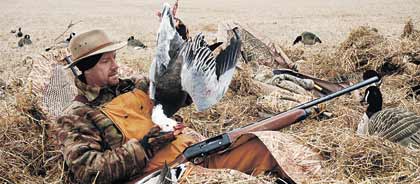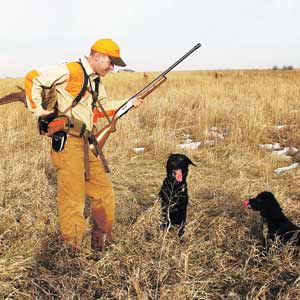The dubious glamour of "hunting for a living."
By Chad Mason
 Sweet success! Sometimes things work the way they're supposed to. |
Whenever people ask me what I do for a living, I generally know what's coming after my answer. When I tell people that I write stories and take pictures for hunting and fishing magazines, their visible response varies on a spectrum from admiration to thinly covered disdain, but the unifying thread of the spectrum seems to be envy. They almost always say, "Must be nice."
Well, as a matter of fact, it is nice. Clearly we outdoor writers must think so, or else we would not suffer the job's starvation wages or the suspicion it inspires among our in-laws. (If you want to get a big laugh out of an outdoor writer, ask about his retirement plan.) Nevertheless, the envy of the general public reveals an essential ignorance about the life an outdoor writer--or at least this outdoor writer.
In the interest of full disclosure, I hope to elucidate the truth about outdoor writing in what follows. With any luck, the truth will save from financial ruin all those who fear it, and inspire those who don't to bravely misspend the best years of their lives as I have unremorsefully done.
First, let us tackle the question of how often an outdoor writer actually goes hunting. During the 2007 calendar year I hunted 22 days. In truth it might be better to say 22 outings, because some of my "days" in the field lasted barely more than an hour. Perhaps the average is three or four hours. Here is the breakdown on what and where I hunted:
Waterfowl: Two days in Saskatchewan, four days here in Iowa; 20 ducks and 19 geese bagged. (Canadian limits are generous.)
Pheasants: Five days in Iowa; six pheasants bagged.
Quail: Two days in Georgia; 16 quail bagged.
Turkeys: Two days in Iowa; one gobbler bagged.
Deer: Seven days in Iowa; two deer bagged (one buck, one doe).
Except for the four days in Georgia and Canada, all hunts were unguided local affairs for which I obtained unpaid access and did my own scouting. I hunted public land only five days last year.
Two revelations occur to me as I recount these numbers. The first is that I had a pretty good year, and am deeply thankful. The second is that my dogs only got out nine times. That's something I need to change this year.
Many of you are probably stunned by these numbers, because you are suddenly realizing that you hunt considerably more often than some of us who "hunt for a living." This fact should prove to the reader what writers already know, namely, that we do not hunt for a living, we write for a living. In a year's time I'll shoot 60 critters and write 60,000 published words, comprising 40 to 50 articles.
Next, how much does an outdoor writer get paid? The answers vary widely. I know one chap with the Midas touch who self-published a book that sold 10,000 copies at a net profit of $15 apiece in only two years' time. That reminds me to extend my thanks to all 762 of you who purchased copies of my book over the past six years. Only 2,238 copies of the First (and obviously last) Edition remain in the publisher's warehouse, so act fast. Thanks to the royalty of $1.29 per copy, there is one more shotgun in my cabinet. Clearly, my book writing falls under the tax category of Charitable Contributions. Magazine articles (barely) pay the bills, producing about the same hourly remuneration that a starting kindergarten teacher might expect.
The above figures need some qualifying comments. First, I am a half-time outdoor writer who works another part-time job. Full-time outdoor writers (like "Shotgunner's Notebook" columnist Layne Simpson) hunt considerably more than I do, and perhaps more prosperously. I've hunted with Layne several times and am in awe of both the acumen with which he handles a gun and the sheer amount of time he spends in the field. Must be nice.
 The author with Woody and Rascal and one of the six pheasants they bagged last season. |
Second, I do at least as much fishing as hunting, and fishing time was not listed above. The fly rod is as important to my life--and my bottom line--as the shotgun. My dogs do like to fish, by the way.
Exactly how good are outdoor writers at hunting? In order to avoid gossip and a vain attempt to quantify the unquantifiable, I will answer this question autobiographically.
On my trip to Saskatchewan I killed 32 ducks and geese with about 40 rounds of ammunition. Two of these unfortunate birds fell to a single shot. They were a pair of mallard drakes crossing over the decoys left-to-right, like a Station 4 high-house at skeet. Due to the overwhelming abundance of birds, five of us were taking turns on the gun in a pea stubble field, and it was my turn.
I flipped the lid on my layout blind, rose to my buttocks, and dumped both birds with one blast from an old Beretta A390. (To verify the truth of this exploit, call Avery Outdoors at 800-333-5119 and ask for Bill Cooksey.) I was literally on fire, and my hosts viewed me with the kind of homage that comes from not really knowing someone very well.
Then, back home in Iowa, I missed five consecutive straightaway pheasants in the same afternoon, killing only one and not surprising my daughters in the least. My least debonair move of the entire season, however, was a complete miss on a standing whitetail doe at 35 yards--with a scoped muzzleloader. In other words, I suspect I'm about like you. Biographies are made great by careful selection.
Finally, the following anecdote typifies the inflated glamour attributed to the outdoor writing life, and how it typically bursts upon contact with the truth.
One of my wife's coworkers is married to an instructor at a local business college. During pleasantries at a staff Christmas party, this fellow was so fascinated by my self-employment that he invited me to come and speak to his class on entrepreneurship. The more we talked, the more it became apparent that my business philosophy was not a good match for the class. Here is the conclusion to the speech I never gave:
"So, in summary, after 10 or 11 years of writing occasional features on th
e weekends in addition to your full-time job, you should have a sufficient editorial network to quit half your job and spend about a day per week hunting or fishing, and more than that at the computer. You'll make far less money than you could by working for someone else, you'll have no benefits or retirement, and most of the people who see your work will pay no attention to who did it.
"Often you'll be obliged to do the hunting that someone is paying you to do, rather than the hunting you want to do, and you'll wonder why you ever thought it was a good idea to turn your hobby into a job. Come January, you'll wonder how in the world you're going to come up with 40 or 50 more new ideas this year.
"But you'll be able to stay home and drink hot chocolate with your daughter when she is too sick to go to school, and that will partly assuage the guilt you feel for the minimal likelihood that you'll have anything to give her when she goes to college. You can write off your vet bills, and once in a while somebody will comp you a free vest or a pair of boots. Occasionally, a reader will approach you and say, 'I feel the way you do,' and the connection will make you glad.
"Any takers?"
Chad Mason's first book, Voices on the Wind, a collection of bird hunting essays, combined grand critical acclaim with lackluster sales. Before the publisher landfills the remainders, buy a copy online from the "Store" section at www.shootingsportsman.com.






